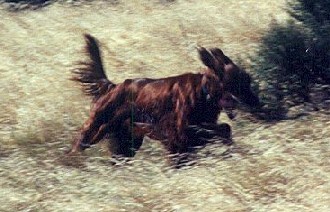 Jackson - Living Happily With Blindness
Jackson - Living Happily With Blindness
 Jackson - Living Happily With Blindness
Jackson - Living Happily With Blindness |
|
|
| Jackson, my 9 year old male Irish Setter,
was diagnosed with diabetes in June 1999. From the beginning, Jackson's
diabetes was hard to regulate. In November of 1999, I noticed his eyes
clouding over. My vet confirmed my worst fears - cataracts from the
diabetes were forming. By December, Jackson was blind. The initial diagnosis was devastating to me. I alternated between guilt, fear, depression, extreme sadness, etc. My initial reaction was that Jackson and I would no longer be able to do all the things we were used to doing. Jackson has always been an active dog - he loves to run for the sheer joy of running. Of course, he's slowed down the last couple years due to his age but he still loved getting out, running through the creeks, etc.  It slowly dawned on me that I could not make the decision for Jackson as
to what he could or couldn't do. It was up to Jackson to make that
decision.
It slowly dawned on me that I could not make the decision for Jackson as
to what he could or couldn't do. It was up to Jackson to make that
decision.Well - guess what?! - very little has changed. We still go to the local homeless shelter twice a month where the kids staying at the shelter can pet, walk, feed, and brush Jackson. Sure, he bumps into things but his tail wags the entire time and the kids still hide the biscuits and Jackson can still find them. We still take walks - we just have a new routine. As we come to a curb I say "step down" and on the other side I say "step up". I still take Jackson to the park, put him on a 60-foot lead and let him trot along exploring as he wants to. I will yell "careful" or "easy" as he gets to a tree, bush or fence and he knows this means slow down, something is there. This summer I will take him to the park with the creek and let him run through the water like he's done so many times before. I can't wait.
Return to the cataract page and read other experiences from owners whose pet had cataract surgery.
Contributed August 2000 |